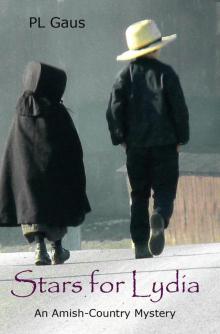- Home
- P. L. Gaus
Whiskers of the Lion Page 5
Whiskers of the Lion Read online
Page 5
6
Wednesday, August 17
3:15 P.M.
WHEN SHERIFF Robertson rounded the corner outside the Helmuth house, he found Professor Branden leaning back against the hood of his white truck reading newsprint, and at the end of the drive Robertson saw Stan Armbruster’s red Corolla turn right onto Township 371. Robertson approached Branden and asked, “Armbruster made it back?”
“Just now.”
“Then where’s he going?”
Branden held up the clipping he had been reading and said, “To get more of these. In Sugarcreek.”
“Really, Mike? The Budget?”
“Stan’s going to check, but read this,” the professor said as he handed the clipping to the sheriff.
Robertson read from the top:
Centreville, MI
North District
July 18—We had hot weather the past two weeks and it was hard on the field corn. Then we got an all-day soaker on Saturday and we are all grateful for the cooler weather.
Gardens here are doing very well. The sweet corn will be ready soon and we’ll start digging up potatoes tomorrow. Some of us are picking purple hull peas and the produce markets have plenty of fruit. Especially peaches are coming in strong here and we are busy with canning them.
Sunday Gemie was at Wayne Hostetlers’ by Henry Schrock. Next to be at Vernon Kropfs’ and service to be by Leland Yoder. Visitors at Hostetlers’ were the Toby Eichers, Sam B. Grabers, and Min. Melvin Troyers. Absent at Hostetlers’ were the Linus Gingeriches who were visiting in Bronson. The flu is going around and several other absences were noted as well.
Some special baby news from this neighborhood is a son born to Chester and Leona Kauffman and a niece born in Boonville MO. for John and Emma Mast. That brings their total to 52, nephews included.
Returned from the West Country bus tour were the Levi Millers and Joe Shetlers. A group is looking into hiring a bus to make the trip to the Jake Schwartz and Anna Bontrager wedding in Mt. Hope, OH. come September. John Coblentzes were to Vista, Colo. to visit her brother Roy after he was kicked by one of his horses and life-lined to Denver, Colo. Going to Wisconsin to see the Andy Wengerds were the Josiah Shetlers with newest daughter Amy and two other children Ben and Mary while the older sons keep duties up around the farm.
Neighbors Albert and Lizzie Kuhns are getting ready for the wedding of their eldest girl Annie, on September 22nd. Her boyfriend is John, son of Andy and Verna Miller of Shipshewana. They were published on July 17th.
Our guests from OH. wish their families to know that they are fine though weary of moving around so much. Maybe they can stay. A Daadihaus was made available to them at the Daniel Gingeriches, woman to sleep in the bedroom, man to take a cot on the screened back porch at nights until winter sets.
—IVAN MILLER
Robertson looked up doubtfully, and Branden said, “That could be Fannie Helmuth and Howie Dent. The ‘Our guests from Ohio.’ In Centreville, Michigan.”
Robertson shrugged out a measure of skepticism and asked, “The other clippings?”
“Stan took them to Sugarcreek. He has an idea how to search them.”
“Maybe the Budget already has a database,” Robertson said. “You know, maybe they keep a database of all the letters that are sent in.”
Branden shook his head. “We called, and they don’t. But Stan says he has it covered.”
“If that’s Fannie and Howie mentioned so openly in this letter, then they’ve pretty much told everyone where they were.”
Branden smiled. “Right. Everyone who reads the Budget. But do you think Teresa Molina is smart enough to do that?”
Robertson pulled his tie loose under his chin. He turned anxiously in place to survey the scene outside at the farmhouse. He waved an arm over the whole of it and grumbled, “We’re wrapping up, Mike. We’ve got nothing solid here, and I should have anticipated that they’d put messages in the Budget.”
“We’re going to read all the Budget letters since April,” Branden said. “And we know Dent’s killer is probably someone local. So that’s not nothing, Sheriff.”
Hands planted stubbornly on his hips, Robertson frowned and shook his head. “He was tortured, Mike, and it’s my fault. I should have figured the Budget angle sooner, and OK—maybe it is someone local. But otherwise, we’ve got nothing.”
“You’re wrong, but OK.”
Robertson responded with a disaffected growl and Branden added, “So what are you going to do?”
“Can you talk to the Dents again?”
“Sure, in the morning. They need some time right now.”
“Then I’m going back to wait on Missy’s autopsy report. There’s nothing more I can do out here.”
“Stan’s work with the letters might give us something,” Branden said. “Maybe later tonight.”
Robertson huffed, “Long shot, Mike. Besides, if Teresa Molina has half a brain, she’s already found Fannie Helmuth anyway.”
“Well, she’s not that smart, Bruce. And she’s not going to read an Amish newspaper. People like her don’t read the Budget. I doubt she even knows it exists.”
Robertson glowered into empty space. Eventually he said, “Tortured and murdered, Mike. If he gave them Fannie’s location, she’s already dead. And if she’s dead because I couldn’t find her, I’m gonna have to resign.”
“Stop talking nonsense,” Branden said softly. “You’re not thinking straight.”
Robertson leveled his eyes at his friend. “I am thinking straight, Mike. If they’ve killed Fannie, I’ll resign.”
7
Wednesday, August 17
3:30 P.M.
WITH THE white box from Miller’s Bakery still on his passenger’s seat, Stan Armbruster drove his red Corolla to Sugarcreek on Ohio 39 from the west. As he came into town, he passed the red-brick Mennonite church on his left. He slowed around the sharp bend at the edge of town and continued past the sprawling Amish flea market on the right, where cars, vans, and buses were scrimmaging for parking spots beside the cluster of old buildings. Slowing further, Armbruster angled gently right onto West Main St. and drove several blocks through an older residential neighborhood into the small downtown business district. At Factory Street, he turned left to follow the railroad yard, and soon after the turn, he pulled in at the plant and business offices of the Budget. His new suit lay in a crumpled heap on his bedroom floor. He was dressed now in brown loafers, tan slacks, and a yellow button shirt, a change of clothes that he thought was appropriate, considering the disaster of his morning. He got out, looped his badge case over his belt, and locked up. Here he hoped to redeem himself with his plans to search all of the letters that had been sent by Amish scribes into the Budget since April.
Inside, Armbruster spoke to the lady at the counter. While she took notes, he explained which back issues he wanted to buy, and then she took her notes down the hall. When the lady came back, she had an old ten-ream copy paper box stacked full of newspapers. When she lifted it up onto her counter, she asked, “This for the sheriff?”
Armbruster nodded and pulled his wallet out, but the lady said, “No charge.”
“Thanks.”
“That’s a lot of letters,” she said tapping the side of the box. “We get them from all over the world.”
“I just need the ones from the States,” Armbruster said.
“They’re all mixed in,” the lady said.
“And you don’t have a database?” Armbruster asked. “You don’t keep any digital copies?”
“No,” she said. “These Amish scribes write by hand, mostly. They mail their letters to us on the Mondays after their Sunday services. Some of the letters are typed these days, but mostly they’re still handwritten.”
“What about when you set type for the paper each week?” Armbruster asked. “That’s digital now, isn’t it?”
“Yes, but we erase the files to make way for next week’s letters. We don’t save a copy.”
“That’d be easy enough to do,” Armbruster lamented. “To save copies I mean.”
“We don’t.” The lady shrugged. “Sorry.”
“OK, thanks,” Armbruster said. He carried the box out to his trunk. He climbed in behind the wheel of the hot car, started his engine, cranked the air conditioner to max, and called Rachel Ramsayer’s cell phone.
Rachel served as IT chief for the sheriff. She had spent the spring and summer months upgrading computers and modernizing software and databases. She had also created a Web site for the sheriff’s department. She was a dwarf woman from Atlanta, the daughter of Caleb Troyer—a friend since kindergarten to both Mike Branden and Bruce Robertson. Cal Troyer was the pastor at Millersburg Christian Church, and his daughter Rachel had moved to town only recently. Because of her relationship to Cal Troyer and because of her extraordinary expertise with all things digitized, she had been accepted as IT chief in the sheriff’s department almost immediately. She answered Armbruster’s call on the first ring.
“It’s Stan,” Armbruster said over the chatter of the Corolla’s interior fan. “I’ve got the Budgets.”
“How many letters?” Rachel asked.
“I’m guessing hundreds,” Armbruster said. “It’s a boxful. It’ll take hours to scan them all.”
“Did you ask again about a database?”
“No luck. They start over each week. They don’t save the files.”
“Have you got today’s issue?”
Armbruster thumbed the papers and said, “It’s the top one.”
“OK,” Rachel said. “You’ll fold and scan, and I’ll devise a strategy to search the results. It’s going be a long night.”
Armbruster put his gearshift in reverse. “Like anybody’s actually slept through the night since April.”
8
Wednesday, August 17
6:45 P.M.
AFTER AN administrative stop at the jail, Bruce Robertson climbed the steps to the back porch of his Victorian house and pushed inside to a spacious and modern kitchen of stainless appliances and white quartz countertops. He called out to his wife and got no response. He changed into house slippers, pulled a Diet Pepsi from the refrigerator, and carried it into the parlor to sit on the sofa in front of the cold fireplace.
When the phone rang, the sheriff had no idea how long he had been sitting there. The Diet Pepsi sat unopened on the coffee table. He answered the call, “Bruce,” and Missy asked, “You cooking anything for dinner?”
“Nope.”
“Go out?”
“Where?”
“I’ll think about that. I’ll be home in thirty minutes.”
• • •
The sheriff was still immobile on the sofa when Missy walked into the parlor. She saw the unopened can of Diet Pepsi, picked it up to gauge its temperature, and carried it back into the kitchen. When she returned, she had a cold Diet Pepsi for her husband. She set it on the table next to his elbow, and she climbed the stairs to change out of her scrubs. When she rejoined her husband, taking a seat beside him, his eyes held a fixed gaze on an inward thought. She reached around him, opened the Diet Pepsi can, and handed it to him. When she gave his hand a nudge, he drank and seemed to regain the present.
Recognizing his brooding mood, she asked, “How long have you been sitting here?” and he answered, “Don’t know. Couple of minutes.”
“Your Pepsi was warm.”
Robertson cast a frown toward the fireplace and closed his eyes. “Been thinking.”
“About what?”
The sheriff turned to look at Missy. “Retirement.”
Missy nodded with a chagrined smile. She recognized the hollow tone in his voice. He had been sliding in this direction since early summer, when it had become obvious that Fannie Helmuth would not be easily found. “You think you’re done with law enforcement?” she asked. “Because I don’t.”
Robertson shook his head and stared again at the sooty bricks inside the fireplace. “I should have found her by now, Missy. Maybe a younger sheriff would have.”
“You don’t really believe that,” Missy said.
Robertson stood to pace in front of the fireplace. He made two passes, kicked an old coal back onto the grate, set his Diet Pepsi on the end table, and dropped back onto the sofa beside Missy. “Missy, Mike thinks there may have been messages that we missed in the Budget. If it’s true, then it’s my fault that Howie Dent is dead.”
“I’m not going to listen to this,” Missy said sternly. “You’ve had your whole department in turmoil since the day Fannie walked out of your jail, and if anyone could have found her, it would have been you and your people who did it. Well, you didn’t find her because she didn’t want to be found.”
“And if she gets dead because I failed?” the sheriff said, turning with weary eyes to face his wife.
Missy stood up in front of him. “Mike said you’d been talking this nonsense.”
“He called you?”
“Of course.”
“What’d he say?”
“That you’d been talking about resigning. Which is nonsense.”
The sheriff stood with a self-disgusted “Harrumph,” and carried his Diet Pepsi back into the kitchen. He poured the rest of the Diet Pepsi into the sink, crushed the can, and cast it into the recycling bin.
Missy followed him into the kitchen and said, “We’re going to the Brandens’ house for pizza.”
“Maybe we could stay in tonight.”
“Not a chance in the world, Sheriff. And you’re not resigning.”
“Oh? Why’s that?”
“Because I’m not ready to retire, and I don’t have the patience to break in some new kid as sheriff.” She fished her keys out of a bowl on the kitchen table and said again, “Pizza at the Brandens’. Then maybe we’ll check in with Rachel and Stan at the jail.”
Robertson followed her out through the back door. “You talked to Rachel?”
“No, Bruce, to Stan. He says the Budget letters are going to give us something we can use.”
“Why’d you call him?”
“He called me at the lab.”
“I didn’t get a call.”
“Bruce, really. After the kind of day he’s had, do you think he’d call you at home?”
“He should have.”
“Well, he didn’t,” Missy said while locking up. On the steps of the back porch, she added, “He’s embarrassed, Bruce. He contaminated a crime scene, and he knew I’d see you tonight. So he asked me to tell you that the Budgets might be useful after all.”
“He can’t have read them all by now,” Robertson said and opened the driver’s door on the Crown Vic. He got in with Missy, and while she buckled herself into the passenger’s seat, he backed up into the graveled alley behind their house.
“He’s scanning them,” Missy said. “Rachel’s scanners have optical character recognition. They’re scanning the scribes’ letters to make digital files, and they’re searching the digital files for specific phrases and key words. It’s impressive, and you need to pay Stan a compliment. He could use a boost.”
9
Wednesday, August 17
9:30 P.M.
AT THE boxy red-brick jail on Courthouse Square in the center of Millersburg, Rachel Ramsayer’s corner desk in the first-floor squad room had been custom built for her because as a dwarf woman of Amish descent, she was only four feet three inches tall. Her desk therefore sat lower to the floor than average, as did her computer consoles, bookshelves, monitors, copier/scanner/fax, and phones. Even her power and data outlets had been custom installed at the proper height for her. The same was true of her light switches, phone jacks, floor lamps, and file cabinets. It was Rachel’s special den, suited
to Rachel’s special size, and it was well insulated from the rest of the large and busy squad room by soundproofing partitions of average height, so that with an excellent degree of privacy behind her tall partitions, she commanded an elaborate IT hub for the sheriff department’s data centers, servers, networks, and systems. Only the communications consoles at the jail’s front entrance had more elaborate equipment.
From her hub, Rachel programmed, monitored, and maintained all of the department’s digital and wireless concerns. It was a system that Rachel had designed and built herself, and it had taken her over a year to accomplish it. More than any other person—and where everyone else had relented—she had dragged the obstreperous sheriff into the twenty-first century by demonstrating to him the power of the digital age, and tonight her accomplishments were proving of greater value to the department than the resolutely twentieth-century Sheriff Robertson could have imagined when Rachel first had laid her IT plans before him for approval.
Now she sat at her desk searching digital files that were coming in from scanners run by Stan Armbruster on the far side of the squad room, and by Pat Lance in Captain Newell’s office on the second floor. At her computer, Rachel had created separate folders for each of the scanners, and as Armbruster and Lance scanned the scribes’ letters published in the Budget, the files automatically accumulated in Rachel’s two new folders, with file names indicating city location and date of publication.
While the initial files accumulated, Rachel had developed a search strategy that employed Boolean operators, finding instances where words such as friends OR visitors OR guests were combined using the AND operator with descriptors such as Ohio OR Buckeye OR Holmes. In this way she was able to identify text segments in which scribes had written about friends/visitors/guests in conjunction with the words Ohio/Buckeye/Holmes. With the early samples, she had learned to include Millersburg and Charm among her location descriptors. Whenever these methods flagged a passage, Rachel printed the passage and marked it with a place/date indicator.

 Stars for Lydia
Stars for Lydia Cast a Blue Shadow
Cast a Blue Shadow Separate from the World
Separate from the World Clouds without Rain
Clouds without Rain Blood of the Prodigal
Blood of the Prodigal Whiskers of the Lion
Whiskers of the Lion A Prayer for the Night
A Prayer for the Night Broken English
Broken English Harmless as Doves: An Amish-Country Mystery
Harmless as Doves: An Amish-Country Mystery